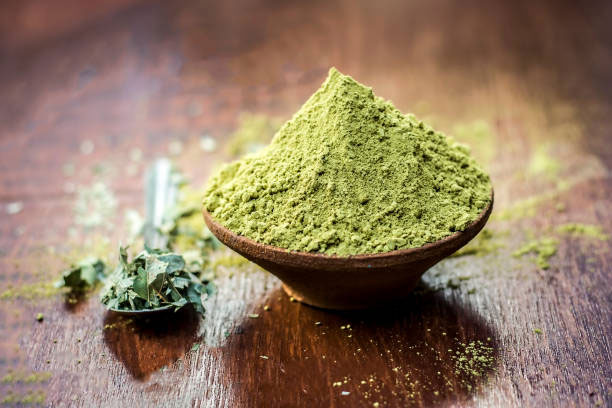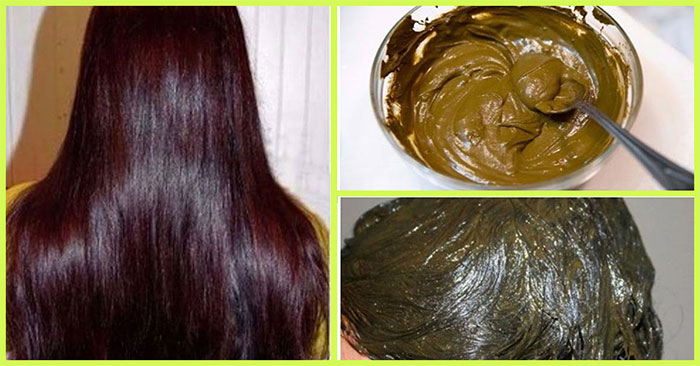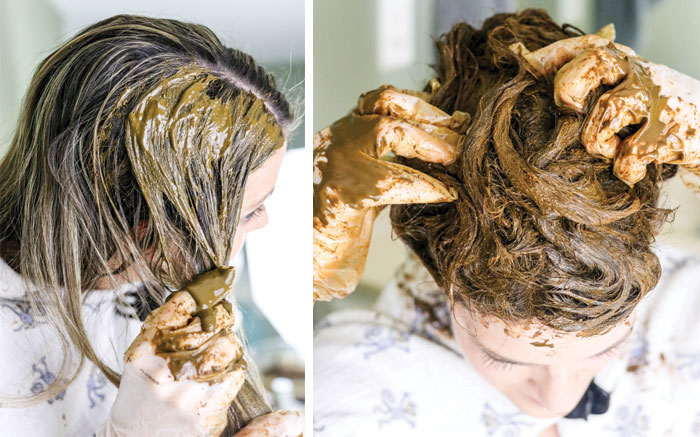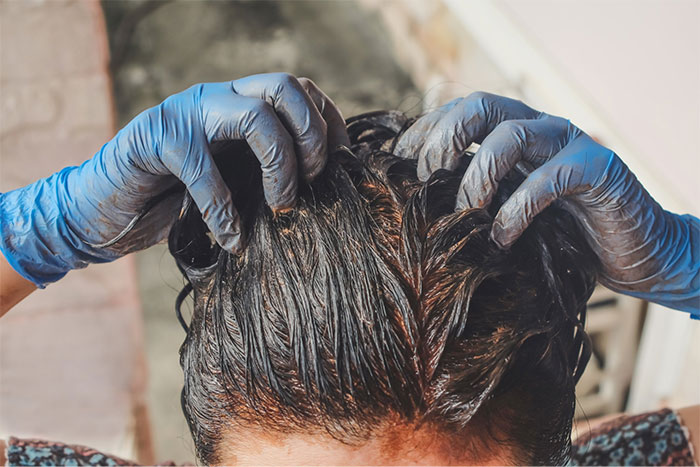Do you want to change your hair look but are already too exhausted from all the damage chemical dyes do to your hair? Perfecting your look will be easier if you know how to apply Henna.
You probably must have heard about the natural dye. Made with crushed leaves, it not only gives a beautiful reddish-brown shade to the hair but is also known to nourish them. But then again, there is always a right way of doing things.
At this point, you might be having several questions in terms of how to use henna, what are the effects, should you put henna on wet or dry hair, and more about it. If you want answers to all, read on as we take you through everything you need to know.
Using Henna On Hair: Let’s Learn The Basics
When you get into the henna world, there is a lot to learn about. This begins with the type of hennas to how you can make it and how to apply to get the best results.
Let’s start with the different variations of hennas available.
How Many Variations Of Henna For Hair?
Henna mostly comes in three popular variants. These include natural, neutral and black henna.
Red
Made with Lawsonia Inermis, the actual henna form, this variant has red-orange dyeing molecules that give hair a reddish-orange stain. Its translucent texture blends well with natural hair color and gives rich color.
Neutral
This is the Cassia obovata plant usually known as neutral/blond henna. Having more treatment benefits, the henna type usually gives no color or a golden yellow stain to the hair. The natural herb is a great conditioner with additional antibacterial and antifungal properties.
Black
This variation of henna is available in two types. The first one has the Para-phenylenediamine (PPD) added to the natural henna powder while the second one has indigo (Indigofera tinctoria). Both of them being different in their compositions also result in different shades of hair.
Henna with PPD results in a brownish-black look while the latter gives a darker black color.
What Is Henna Hair Dye Made Of?
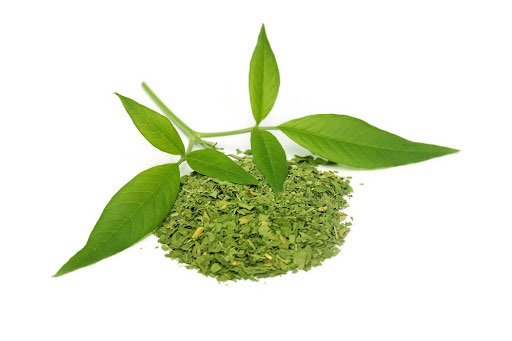
Henna itself originally comes from the Lawsonia Inermis or henna tree which mostly gives away the red-orange dye. What’s important in henna dye-making is the process.
The leaves that are taken from the tree are dried, crushed, giving the dark-green powder. The henna is usually mixed with different ingredients to make a dye that gives a preferred color and nourishment to the hair.
What Is Henna Hair Treatment?
Henna Hair Treatment is nothing but another name for how the natural herbal powder is used as a hair care remedy. When applied to hair, it puts a coating on the hair.
Many women feel their strands are healthier and stronger after its application. For the longest time, henna has been used as a natural panacea for hair problems in many parts of the world.
It helps hair growth, helps reduce hair fall, and helps maintain a healthy scalp. The natural dye is mixed with many other organic ingredients such as essential oils and plants that enhance its benefits.
So let’s get into the details of how Henna does help the hair.
How Does Henna Help Your Hair?
Henna is nature’s bliss. Not only it brings a beautiful, rich color to the hair but it is abundantly beneficial for hair. It is responsible to curb many scalp issues while making the hair very healthy.
Following are a few of the most popular benefits that top the list.
Say Goodbye To Hairfall
Out of the many benefits of Henna, one prominent one is that it maintains and balances the pH levels of the scalp. It helps unclog pores and also prevents excess sebum in hair. All this combines to give a good healthy scalp and follicles which means boosted growth and less hair fall.
Say Hello To Healthy Scalp
Keeping the extensive antifungal and antibacterial characteristics of henna helps in a clean and infection-free scalp. Moreover, the calming and cooling properties of the plant help prevent itchiness and inflammation.
Dandruff Far-away
When dried in hair, the henna can have a scrubbing and cleaning property that removes any excess grease and dirt from the scalp. This includes dandruff too. Not only does the Ayurveda cures dandruff problems, but it also stops them from coming back.
What Kind Of Henna Is Good For Hair?
Almost all kinds of Henna are good for hair. As long as it is organic and not mixed with other chemicals, the natural soother is nourishing food for hair.
Variations of henna that have Para-phenylenediamine (PPD) might irritate some skin types, so you need to be careful in the usage of that.
With that here is a lifetime tip: Always test!
Yes, that’s right. Be it an organic or artificially mixed beauty, cosmetic product – we might not be aware of the chemicals or their effects. Hence, always work on a patch of skin first and then do the entire skin.
The same goes for any henna variation you are using. First, try it out on a small part of the skin and then do the whole to avoid any adverse circumstances.
If your mind is already thinking in the negative, then read on to see if there are any side effects of henna.
Does Henna Have Any Side Effects On Hair?
Henna on itself doesn’t have any side effects. In its purest form, the natural dye is bliss for people looking to have a hair color transformation. If this is so then what’s the scare?
Note that just like many other natural remedies, this one has also become available in processed forms. And here are some side effects that one might face.
Allergy Or Irritation
These processed forms are commercially popular and contain many chemicals that may cause allergies. One of the most common of these is Para-phenylenediamine (PPD) which can irritate and in worst cases severe chemical burns on the skin. You must read labels of the processes, commercially available hennas especially Black henna.
Dryness
Other than this, natural henna is often associated with dryness. This again is a result of additional chemicals that have become a common part of the mix. You must always read the labels to avoid this. Moreover, you can simply add other organic ingredients that can enhance the benefits.
Flu or Cold
Naturally henna has cooling properties that may cause flu-like symptoms like a runny nose or a headache. Try not to sit under a fan or in AC after applying the treatment.
Hair Breakage
The application method also matters in avoiding some side effects such as hair breakage. People often don’t know the correct way of applying or washing off henna and so sometimes hair gets tangled and breaks.
In the next few parts, we will be breaking down which hair condition you should apply henna to and what are the ways to make henna usage wholesome for you.
Read on!
Henna On Wet Or Dry Hair: How’d You Know?
When it comes to henna application, people frequently ask many questions such as whether their hair should be washed, wet, or dry while application. To get one thing out of the way is that your hair should be clean as it allows better absorption.
As for the case of whether it should be applied on wet or dry hair, the answer to it would be that it depends on an individual and hair type. If you find sectioning easier in dry hair then that can be it otherwise damp hair is known to be a popular way.
It is so because applying henna to wet hair comes with good reasons such as better absorption and easy handling. Moving on, let’s read about why applying henna to wet hair could be the right way.
4 Reasons To Apply Henna On Damp/Wet Hair Only
Applying henna on damp hair has become a popular way of usage. Here are four reasons why.
- Clean & Nourishing
If you deep condition often, then you would know that often treatment is recommended on clean, towel dry/damp hair. This is because deep conditioning after shampoo helps release the build-up, sebum, and debris letting more ingredients absorb.
In the same way, applying henna to well hydrated, clean hair makes absorption better and helps enhance the benefits of the natural herb.
- Easier To Handle
Dry hair can be harder to handle when it comes to applying henna. The sectioning can be hard to do and there could be potentially more breakage because of the constant hassle of sorting out the tangled hair.
- Can Get You Better Color
Most reviews and community platforms have the common consensus that color results are mostly the same in both techniques. However, some say applying henna or any herbs onto wet hair helps it penetrate more easily.
This especially works when using henna with indigo. If a dash or so of salt is also added, the indigo absorbs better into the hair giving dark, rich black color. So this could be a winner here!
- Less Wastage Of Time & Product
Henna dries faster on dry hair making the entire process of applying a drudgery and time-taking. Imagine having to comb through a dry henna mask on your hair – one can feel the pain already.
Damp hair on the other hand is easier to part, comb, and apply product to. It is also true that dry hair requires more henna than otherwise.
Can I Apply Henna On Dry Hair Anyway?
Yes, you definitely can.
Just as mentioned previously too, there is a common opinion that both techniques almost have the same results. It is just about handling the hair and how some believe that wet hair makes it easy in that case.
Some people think that henna on dry hair can be chemical-like more effective. Some argue that there is no water barrier and hair absorbs the color better in dry hair. In any case, everyone has a different hair type and one should use the technique that best suits them.
Effects Of Henna On Unwashed Hair
Now this one is a definite no.
With as much research as we could pull, it is evident that unwashed hair is prone to clogged pores, sebum, and other dirt particles that could eventually impact the henna results.
No one would want to go through the long process of henna application only to not get the rich color of it. Henna is not only a natural dye but a very nourishing hair treatment too. Unwashed hair will only limit the benefits as oily strands wouldn’t allow the herbal mix to sink in.
So ideally you should wash your hair right before or a few hours earlier than applying the henna. If you are still confused about how to go about preparing the henna and its application then hold up a little more, the next section is just about it.
How To Prepare Henna For Hair?
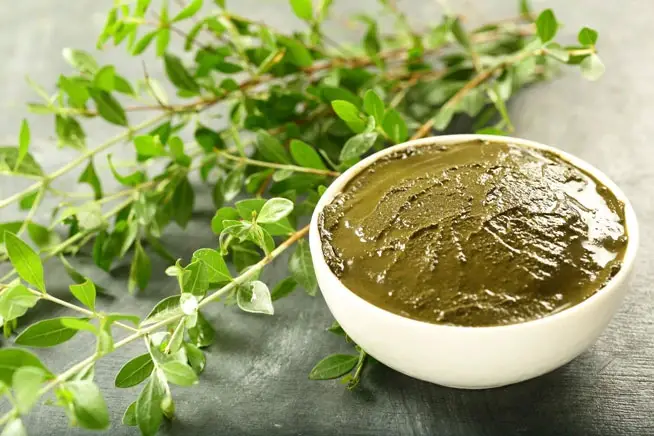
There is no single way to prepare henna. Around the world, the natural dye is used with multiple ingredients to form different kinds of packs. Each of these packs has organic elements that enhance the properties of the henna itself.
However, moving forward, we will take you through the basic steps and dos of preparing henna for hair.
Step 1: Getting The Right Henna
We have put in some recommendations later but here are some basic things to look out for. Firstly get organic label henna, which is pure. This will be green in color and will have no pungent or chemical-like smell. Make sure you don’t get black or purple henna because that would mean it is not pure.
Hennaing hair is a forgiving process and you will not have to be very but considerably precise with the amount of content used. Usually, 50-100g is enough for short hair
and 200g for long hair.
You can get your henna from an online or physical supermarket very easily.
Step 2: Mixing Of The Henna
Once you have gathered all the additional ingredients you need, if any, the next step comes to the mixing part. Just pour the powder into a bowl and add the liquid content. Stir gently until all lumps smoothen.
The consistency of the mixture should be very similar to that of yogurt. It should be thick enough to stick to the hair. This process can certainly get messy. Wear gloves and clean immediately if you drop the mixture on a surface.
Step 3: Let The Henna Sit
Cover the bowl with plastic wrap and let the mixture sit for a couple of hours. For better results, you can also keep it overnight. This helps the dye to oxidize. You will know once you see the color change from green to dark brown. This is the perfect time to apply for it.
You can then put on the hand gloves and start applying the henna on sections of dry or damp hair. Ensure to cover all parts and leave no untouched spots. Once you do this application, you will be good to go with lusciously red-brown hair.
Other Items You Might Need
As mentioned earlier, you could always add some additional natural ingredients to enhance the color or the abilities of the henna mixture. People create different kinds of hair packs based on their hair needs.
Here are a few that help in achieving a certain color or healthier mix:
- Vinegar, lemon juice, or red vine can be used to get a bright strawberry blonde. Other times brandy is often used to get a deeper red tone. Coffee or tea are also commonly used ingredients to achieve brown tones on the hair.
- Essential oils or carrier oils can also be added to the henna to make it more fragrant or nourishing. A few drops of coconut or mustard oil could add extra moisture and give your hair more nourishment.
- Often egg, banana, or yogurt are also added to henna to make it a good food for hair. Egg as known gives a protein boost whereas banana can be all moisturizing for the hair. Often at times, henna is mixed with other earth elements such as clay powder to reduce hair loss issues.
Tips And Precautions
If reading this makes you think of the worst, then let us tell you there is nothing to worry about. Henna is natural and it won’t do any harm to your hair even if you miss a step or so.
However, some things can make the application better and free of any possible errors. Whether applying henna on wet or dry hair, the following will be helpful.
A Few Tips
Use a hairbrush: Henna is very nourishing but that nourishment is only possible if the henna reaches your roots and the mix is well applied to the entire hair. Using a hairbrush helps in this case and as a result, you can have healthy and shiny hair.
Cover hair with plastic wrap: Using a shower cap or plastic wrap could help keep the henna warm and hence increase its absorption. This could mean better coloration of your hair.
Rinse using a conditioner: This will help loosen the henna from the hair and help you completely wash it off. Moreover, it could also be more moisturizing compared to just using a shampoo or water.
Precautions To Take
Use Gloves: Henna can be a messy process. Make sure you are wearing gloves and protecting your clothes and nearby surfaces too. Henna can very swiftly leave a stain so take all necessary measures to be safe.
Protect your skin: Just like surfaces. Henna could leave a stain on your skin or irritate the fragile parts. The most vulnerable part is the neck and your hairline. To protect it apply some vaseline so there is no staining or irritation. Moreover, keep the henna away from your eyes too.
Ensure you have no existing irritation or open wound: In case, you suffer from an existing scalp condition or have any open wounds then you should avoid applying henna altogether. This could cause more severe problems.
If you have recently dyed your hair: In this situation, it is best to wait at least 6 months before you do a henna treatment. It is so because hair exposed to chemical dyes is weaker and applying another treatment may lead to hair fall.
Always do a patch test: This is possibly the best way to avoid any trouble. Apply henna to a part of your skin and then to the whole. If you have any skin irritation, it will be identified quickly without any greater damage.
Recommended Henna To Use
Henna is easily available online and in-stores. You must read through the labels of any product. In the case of henna, please ensure that you carefully pick organic hair henna instead of the ones used for hands or other parts of the skin.
We have picked the top-selling hennas on Amazon and listed them here for you:
- Just Jaivaik Organic Henna
- The Henna Guys Henna Hair & Beard Color
- Zenia Pure Natural Henna Powder
- Godrej Nupur Henna Powder
- Reshma Beauty Henna Hair Color
- H&C 100% Natural & Pure Henna Powder
- Dabur Vatika Henna Hair Color
- MB Herbals 100% Natural & Pure Henna
- Surya Brasil Products
- Hannah Natural 100% Pure Henna Powder
How Long To Leave Henna On Natural Hair?
You can leave henna for about 2-6 hours on natural hair. The longer henna stays on your hair, the better color results you get. Longer hours help the natural mix to properly penetrate through your hair and roots.
In addition, henna is a very healthy hair mask. It helps your hair get rid of several problems. Leaving the natural mix for hours will cause no harm. However, if your hair is dry then try to limit your duration.
Should Henna Dry On Hair?
Not completely. Hair has a high risk of getting very dry after a wash or even breaking while you try to wash it. Leaving your henna on for hours without ample moisturizers in it can result in more damage than good.
Imagine having to detangle very dry hair? It’s not a very good look. Henna is also said to change the structure of hair strands temporarily making them more straw-like after wash. This situation can be avoided to an extent if one doesn’t over-dry their hair.
How To Wash Hair After Applying Henna?
If your hair is not overly dried with henna then lukewarm water can be used to run through the hair. Once the hair is completely soaked, you can use your hands (covered in gloves) to start slowly getting the henna off. Make sure this entire process is done with your hair turned upside down.
On the plus side, you must use an ample amount of conditioners to loosen up the henna. You can also use a comb to slowly detangle. Also, try detangling the ends first and then move towards the roots. This way there will be less breakage and less pain to your treated scalp.
Once you have ensured all henna is out, just towel dry your hair. You can also shampoo your hair later if need be.
How Often Henna Hair?
You can apply henna to your hair once every 4 to 6 weeks. Henna color doesn’t fade away quickly and is usually very long-lasting. The duration of applying henna also depends on your hair growth and hair strength. If your hair growth is fast, you might have to touch the roots more often.
Is Henna Hair Dye Permanent?
Yes, henna is a permanent dye. It lasts up to 4 weeks or even longer at times. If you wish to go for a chemical dye or lighter hair after the treatment, it might be very challenging because henna is very difficult to lift.
Frequently Asked Questions
Here are answers to some commonly asked questions related to henna usage.
Is Henna Hair Dye Safe During Pregnancy?
Entirely organic, pure henna is safe to use during pregnancy. This means the product has no additional chemicals. Henna is often suggested as an alternative to chemical dyes for usage during pregnancy.
Is Henna Hair Removal Safe?
Henna IPL hair removal system could be a safe option to use. But again you must take expert advice on the matter and consult a skin specialist before any action.
Can Henna Hair Dye Cause Headaches?
Yes, one can experience mild headaches due to henna application. The reasons can include but are not limited to are the pull of drying henna on the hair follicles or the cooling sensation or smell that could create discomfort.
So Henna Should Be Applied To Wet Or Dry Hair?
When it comes to henna, there is a lot that goes on with its application. So whether to apply henna on wet or dry hair is not the only question that should strike you when taking a henna treatment.
If you had those many questions, we hope the above article provided you ample information to get started with your henna routine. All-in-all, henna is a very useful and natural magical dye to bring beautiful colors to the hair.
Adding to that, its nourishing properties are an add-on to the herb’s miraculous benefits. With that, please know that all hair types are different, ample testing and experimentation will help you understand what’s best for your hair.
Till then, happy henna-ing your hair.
- Crochet Braid Hair Cost: Hope for a Style to Slay!! - January 9, 2024
- Best Braid Pattern For Crochet: Hair-Styling Tips And Tricks - January 3, 2024
- How To Braid Hair For Crochet: Best Hair-Styling Tips! - December 26, 2023

